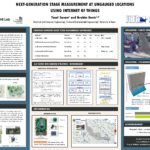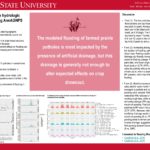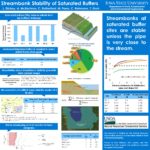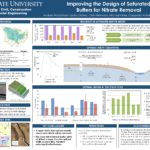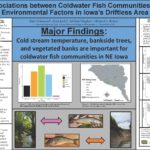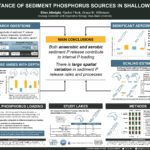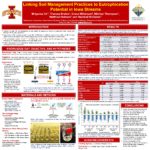The 17th annual Iowa Water Conference will be held on September 19-20, 2023, at the Meadows Events and Conference Center at Prairie Meadows in Altoona, Iowa.
Continue reading2023 Iowa Water Conference: “Navigating the Extremes” Pre-Conference Tour
Prepare for the 2023 Iowa Water Conference: “Navigating the Extremes” by taking part in the Pre-Conference Tour!
Continue readingNavigating the Extremes: Call for Conference Presentation Proposals
The 17th annual Iowa Water Conference will be held on September 19-20, 2023, at the Meadows Events and Conference Center at Prairie Meadows in Altoona, Iowa. This year, the conference theme is “Navigating the Extremes.” Climate change has been disrupting water supplies and impacting the environment, socioeconomic structures, and ecosystems, such as forests, soils, lakes, cities, and communities.
Continue readingThe #IowaWater2020 Welcome Speech That Will Never Be Given
Post written by Melissa Miller, Associate Director for the Iowa Water Center
Today, at 10 a.m., I was supposed to greet 500+ of my closest friends and colleagues and say (with gusto), “Welcome to the 2020 Iowa Water Conference!”
If you’ve been our conference (or any conference, really), you know how that speech goes.
I would have thanked the planning committee for their tireless efforts in shaping the very best conference agenda for this year, a program that resonated with the theme “Bringing our water vision into focus.”
I would have thanked the sponsors and exhibitors for their generous support year after year.
I would have thanked you for coming and urged you to attend sessions outside of your comfort zone.
I would have introduced you to our amazing new conference logo and told you everything it stands for.
But, instead, at 10 a.m. on Wednesday, April 8, 2020, I’m making a mid-morning snack for my elementary-aged daughters before we go on a walk to the “creek” (okay, it’s a drainage ditch). I haven’t been to Ames in almost a month, and I don’t know when I’ll go again.
———————————–
When we announced the cancellation, we had many people reach out to us and express their condolences for the months of lost work and preparation. This missed opportunity to connect and grow side by side is suddenly a common tragedy of this strange new era. We lament with those who planned to present, with the students who planned to compete in the poster contest, for the morning sticky buns we won’t get to eat (I know at least a couple of you were already lamenting the loss of “Scheman Lasagna” from years past, for some reason).
But remember: the Iowa Water Conference is just two days. The work that went into it is not lost. We still had a diverse mix of organizations collaborating to conduct peer reviews of the latest water work in Iowa. We still had hours of introspection and discussion to identify the most pressing topics in water resource management in Iowa. We still built new relationships and cultivated old ones with Iowa’s hardworking water professionals and scientists. Building the Iowa Water Conference takes the entire year – for all of us. The two days is just the celebration.
—————————
In my welcome speech, there is one more thing I would have done this year. I would have challenged every single one of you to consider two questions as you listened to each presentation:
Who cares?
So what?
(Shout out to Molly Hanson, co-founder of Women for Water and conservation and community outreach specialist for RDG Planning & Design. Molly came up with this idea after we discussed my theory on cultivating and stewarding a community of “Water People.”)
This challenge still applies to the work you do, day in and day out. Ask yourself, who cares, and so what? Answering those questions both affirms the importance of the role you play and brings you closer to understanding how to reach the communities in which you’re working.
My final comment of the Welcome Speech That Will Never Be Given: we can and should still work to build a shared vision for Iowa’s water future. What do YOU want for Iowa’s future? Compare your answers with others’ answers. Where are we the same? Where and why are we different? What are our overarching goals that benefit the most people in an equitable and just way? What can you do in your work to move us toward those goals? And, perhaps most importantly, what will it look like when we get there?
Have an answer to any of these questions? Join in the conversation on Twitter with the hashtag #IowaWater2020. Jump in with real-time dialogue in our Water Scholars Book Club on Facebook. Send us an email.
Talk to you soon.

Melissa Miller is the associate director of the Iowa Water Center. She holds a BS in Kinesiology with an emphasis in Community and Public Health and MS degree in Community Development with an emphasis in Natural Resource Management, both from Iowa State University.
2020 Iowa Water Conference Posters
To see posters in greater detail, visit our flickr page.
#IWConf20 Call for Presentation Proposals
Deadline: September 30, 2019 11:59PM
Iowa Water Conference 20/20: Bringing Our Water Vision into Focus
Scheman Building, Ames, Iowa
April 8-9, 2020
What does the path to meaningful change look like across the vast spectrum of water resource issues? Who are the drivers of change and who should be included at the table as critical change agents? The theme of the 2020 Iowa Water Conference is centered on answering these questions. We want to transform water resource work in the year 2020 to be 20/20 as an effort to refocus our vision of the future for how we can promote inclusive, resilient water resource management.
This conference will focus on our evolving relationship with water at a personal and societal scale, as well as what the future may hold if we continue our current trajectory. Through scientific discovery, diverse change agents, and foresight on future challenges, we will move into an equitable and verdurous world of the future.
The committee welcomes proposals on all water-related topics, but especially encourage submissions that address:
- Equity, inclusion, and environmental justice
- Innovations in agriculture for future resilience
- Emerging water resource contaminants
- Meeting future Gulf of Mexico Hypoxia targets
- Social impacts on conservation
- Mitigating climate change impacts on water resources
- Nontraditional approaches to citizen engagement with water
Read more here.
2019 Annual Photo Contest
View photos from the 2019 Annual Photo Contest.
Continue readingIn a word: overwhelming.
Post written by Melissa Miller, Associate Director for the Iowa Water Center
As I reflect on the 2019 Iowa Water Conference, the first word that comes to mind is overwhelming.
Overwhelming numbers – of people attending, sponsors and exhibitors, and speakers.
Overwhelming breadth of topics and information presented.
Overwhelming energy, optimism, new ideas.
Overwhelming support from you, the Iowa water community.
This is the seventh Iowa Water Conference I’ve coordinated, and I have to say that this one took me by surprise. I felt differently going into it, knowing how much effort the conference planning committee put into developing a well-rounded program and knowing beforehand that we were expecting the biggest conference crowd in the 13 years of the Iowa Water Conference. What was surprising – overwhelming – was the feeling that our water community is more vibrant, more invigorated, more ready to act than ever.
What we’ve always known to be true – that all water has value and a systems approach to watershed management is the only way we will build a sustainable water future – has been neatly articulated by the US Water Alliance as the One Water Approach, presented by Radhika Fox. It’s messaging we can all use in our work to bring new partners on board and develop relationships that didn’t previously exist.
What we’ve faced repeatedly in our work – that we must engage the citizens in our watersheds, but that’s easier said than done – is receiving new life in the form of interactive exhibits and personal storytelling like We Are Water Minnesota; in the crazy, exciting, and realistic flood resiliency tournament used in the East and West Nishnabotna watersheds; in the message that the ideals of citizenship are perhaps even more important in our watershed communities. It’s a reminder that all communication starts with meeting someone where they are and valuing their personal, lived experience before trying to share your message.
What remains to be learned – there is new research, new methods, new discoveries happening constantly with water – is best discovered in a shared learning environment, making the conference more than just a place for information overload. It’s a place where we make and renew friendships and partnerships with those who are working toward the same goals as we are and processing that information together.
I really shouldn’t be surprised that bringing together 550 passionate, intelligent, diverse, and hardworking individuals would be overwhelming (even for me, the most extroverted of all extroverts). It’s just that there are so many highlights from this year’s conference – those mentioned above, and at least 100 others I could mention – that I don’t know yet how to top it next year.
I’ll leave you with an invitation – please share with us what would make this conference overwhelming (in a positive way) – every year. On April 17, we will gather in Ankeny to brainstorm and plan for 2020, and everything is on the table (venue, dates, branding, themes, speakers, logistics, etc.). If you want to be a part of that meeting, contact us. If you have suggestions for the conference, contact us. If you want to keep this energy going throughout the year and need some resources, contact us. Stay in touch – and we’ll see you in 2020.

Melissa Miller is the associate director of the Iowa Water Center. She holds a BS in Kinesiology with an emphasis in Community and Public Health and MS degree in Community Development with an emphasis in Natural Resource Management, both from Iowa State University.
Working with Nature!
From Iowa Learning Farms
I spent this summer traveling to field days around Iowa as well as driving back from our American Society of Agricultural and Biological Engineers (ASABE) annual meeting in Detroit, Michigan. One of my purposes in attending the ASABE meeting was to accept for the team the Blue Ribbon Award in the Educational Aids Competition for our revised version of the Water Rocks! Rock Your Watershed! online game (read more about it in our previous post Water Rocks! Brings Home a Blue Ribbon). Part of our revisions included adding more diversity to the land management choices that players can make and clearly showing the environmental benefits of diversifying our watersheds. Driving around the Midwest and Iowa really brought home to me how important this is and how far we need to go to still achieve the kind of diversity that will make a difference.
But last week I traveled to the Iowa Great Lakes area for a field day and then stayed up there for some vacation time with my family. The field day near West Okoboji Lake focused on prairie and wetland restoration to clean the water before it enters the lake. The side benefit would be increases in wildlife including pollinators of all sorts. The next day we visited our prairie strips site that is directly east of Big Spirit that was installed a few years ago for the same purpose of protecting local water quality and increasing habitat. In both cases, local stakeholders came together to diversify the land to help protect a local asset. I could hear the pride in their voices when discussing the changes they had put into place.
 I am an engineer and spend a lot of time writing and talking about new technology. However, this summer really highlighted to me that many of our fixes cannot be solved by technology alone. Instead, we need to strategically restore or implement more diverse natural systems where they can do the most good in terms of water quality, wildlife and overall land health. We are able to do these practices such as prairie strips and wetlands by combining technological advances with a solid understanding of the natural ecological system that was replaced with row crop agriculture and other development. Modern technology helps us know where to place the natural system for the greatest benefit. After that, the natural system will do all the work.
I am an engineer and spend a lot of time writing and talking about new technology. However, this summer really highlighted to me that many of our fixes cannot be solved by technology alone. Instead, we need to strategically restore or implement more diverse natural systems where they can do the most good in terms of water quality, wildlife and overall land health. We are able to do these practices such as prairie strips and wetlands by combining technological advances with a solid understanding of the natural ecological system that was replaced with row crop agriculture and other development. Modern technology helps us know where to place the natural system for the greatest benefit. After that, the natural system will do all the work.
Both of the restored areas I visited near the Iowa Great Lakes are less than five years old. The local folks are doing a good job of ensuring diversity in the perennial plantings. I have seen other areas in Iowa under perennial vegetation that opted for monoculture grasses, mainly cool-season grasses. While the diverse native prairie restorations are more challenging to manage, the beauty alone makes it worth it to me. Factor in water quality, wildlife and land health benefits and it is a home run.
If this is something that interests you for the land you own or manage, there is assistance and information available to you. We are really fortunate in Iowa to have organizations such as the Tallgrass Prairie Center that have spent years figuring out how to support landowners in planting and managing prairie restoration on the land. For my part, I am going to continue to work to understand how to best manage these systems and what technology is needed to allow diversity to flourish. I would encourage you to go online to www.waterrocks.org and play the Rock Your Watershed! game to learn how we can work with better with the natural systems.
And also, take some time to find those natural areas around you and think about how we can use natural systems such as wetlands, prairie strips, oxbow restoration, riparian buffers, and others to help clean our water, diversify our landscapes, increase wildlife and enhance the beauty on the land. I know I felt a little “restored” after my time in these natural settings.
Note from the Iowa Water Center: Have a story to tell about bringing the land back to basics? Submit an abstract to the 2019 Iowa Water Conference
Call for abstracts for 2019 Iowa Water Conference now open
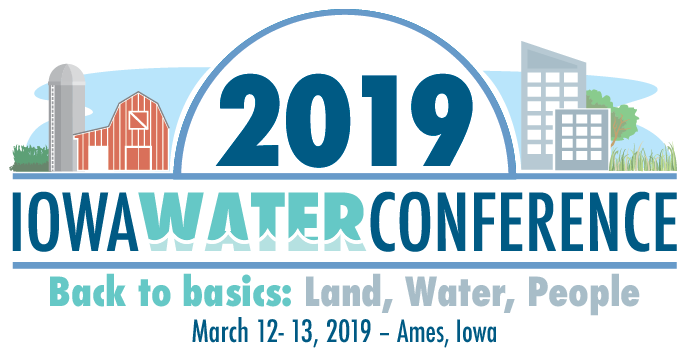
The Iowa Water Conference Planning Committee is proud to announce that the theme for the 2019 Iowa Water Conference is, “Back to Basics: Land, Water, People.” This theme is inspired by the need for our communities to look back on our history with the landscape and focus on the basics when it comes to building resilient communities.
We invite water professionals, researchers, and graduate students to submit presentation abstracts centered around the theme. The State of Iowa has the most altered landscape in the nation. Increasingly, we look for solutions to our water management issues that bring us closer to nature and back to Iowa’s natural environmental processes. From restoring prairies and wetlands on agricultural landscapes to green infrastructure that couple natural and engineered systems, we are building a future through a respectful look to our state’s history. By getting “back to basics,” we are focusing on the entire ecosystem, with water as the connector.
The call for presentations, including instructions for submission, can be found here.
The call is open from August 15 – September 30.
Questions can be directed to Hanna Bates, Program Coordinator for the Iowa Water Center at hbates@iastate.edu.

